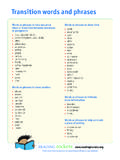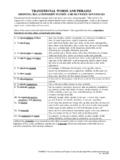Transcription of The Veterans’ Transition Review
1 Lord Ashcroft kcmg pcThe veterans Transition ReviewLord Ashcroft kcmg pcThe veterans Transition Review Lord Ashcroft kcmg pcFebruar y 2014 Contents Introduction: Why Good Transition Matters 5 Conclusions and Key Recommendations 11 Complete List of Recommendations 17 About the Review 27 Chapter 1: Education and Training 31 Chapter 2: Resettlement and Employment 49 Chapter 3: Housing 77 Chapter 4: Health 95 Chapter 5: Welfare and the Third Sector 123 Chapter 6: Financial Aspects of Transition 141 Chapter 7: The Armed Forces Covenant and veterans Advocacy 153 Chapter 8: Information Provision 171 Chapter 9: Reservists 181 Appendices Terms of Reference 187 List of Those Consulted 191 Research 1975 Why Good Transition Matters7In the year to last November, 22,5301 personnel left the Regular Armed Forces: 14,520 from the Army, 4,010 from the Royal Navy and 4,000 from the RAF.
2 The Transition from Service to civilian life has usually been thought of in terms of individuals. On joining, young volunteers adopt an ethos of selfless service, a lifestyle far removed from that of the civilian, ready to go wherever they are ordered, totally committed to the task in hand, and ultimately prepared to give their lives for their team and their mission. As a result, the argument goes, society has a duty to ensure that on leaving the military they are integrated successfully back into civilian society and suffer no disadvantage as a result of having the same time, some in the Services while agreeing with this in principle do not consider Transition a high priority.
3 They contend that it is the Forces role to fight, not to prepare their personnel for civilian life, or they believe the function has been outsourced and is therefore not their want to contest both these ideas. Society and the state certainly have a responsibility to those who have served. But ensuring a good Transition is more than a matter of meeting our obligations to a series of individuals. It can help to promote the core functions of our Armed Forces, and consequently should not be thought of as a fringe activity. This is because good Transition can make a difference to what I term the four R s: Recruitment, Retention, Reputation and the is expensive for any organisation, and particularly so for the Armed Forces.
4 Around one third of all Service Leavers are discharged because they fail to complete basic training, often because of fitness or an inability to cope with the very different lifestyle. Recruiters will quite reasonably allow through the door some marginal cases, who may after all flourish. But attracting larger numbers of higher-quality applicants could mean better all-round performance and significant savings. The more potential recruits (and their families and teachers) believe that joining the Forces leads to a fulfilling subsequent life and career, the more will want to is vital to the Armed Forces, increasing capability and reducing training costs. Nearly half of those who join serve less than six years.
5 Experience has shown that improving the education and skills of Service personnel, thus increasing their chances of a good Transition , has the effect of encouraging them to stay rather than cause a rush to the gates. Being more confident about their security, they know they will be marketable whenever they leave and are therefore in less of a hurry to do , good Transition is important for the country. Having invested heavily in the training and development of individuals over months or years, the public can expect the Forces to ensure that those individuals are in a position to be net contributors to society not just during their Service career but when they overall reputation of the Armed Forces is extremely positive, and rightly so, but with one troubling feature.
6 Research2 I published in 2012 found that 91% of the British public thought it was common (and one third thought it was very common) for former members of the Forces to have some kind of physical, emotional or mental health problem as a result of their Service. Not only is this untrue, it is damaging, since it implies that the Forces do not do enough to look after their personnel and creates an extra hurdle for Service Leavers looking for a job. Better Transition will demonstrate that former Service personnel are valuable contributors to society rather than victims, thereby creating further opportunities for them and enhancing perceptions of the Forces as an better Transition leads employers and the public increasingly to associate military Service with greater skills and career prospects, recruiting Reserves will become easier.
7 This is a pressing priority given the proposed future role of Reserve great deal of high-quality provision is in place to assist with Transition , within the Services and through central government, local authorities, the Third Sector, business and elsewhere. This continues a long tradition, begun by the Forces own regimental and cap badge bodies. More recently, the Armed Forces Covenant has for the first time set out the nation s intention that former Service personnel should be treated fairly and not disadvantaged in comparison with their civilian peers or, in the case of those whose health has suffered as a result of their Service, be entitled to special treatment.
8 The focus provided by the Covenant has contributed to the enormous amount of work that has been done in recent years to improve this , most Service Leavers already make a successful Transition . The Armed Forces offer what amounts to Britain s biggest and best apprenticeship scheme. Moreover, no other institution does so much directly to promote merit-based social mobility on such a large scale; recruits who often come from difficult backgrounds in deprived areas are equipped for extraordinary lives and careers. The great majority of Service Leavers who look for work find it quickly. Despite the widespread public belief to the contrary, relatively few experience serious The Armed Forces & Society, May 2012.
9 See , there can be no doubt that some Service Leavers suffer real hardship; for others, Transition is simply more of a struggle than it could be. I believe there is scope to make changes that will improve their should doubt my determination that all Service Leavers who need extra help should get the very best available. But it is important to recognise that this group is relatively small. Labelling the majority as damaged does a disservice to Service personnel and veterans as a whole, restricts their prospects and diffuses efforts that should be applied to those who most need support. Greater recognition of this could mean more successful outcomes both for Service Leavers in general and those who currently trust the proposals in this report will help ensure a smoother and more successful Transition for more of our Service Leavers ideally to the extent that Transition is no longer an end-of-career issue and that the country is better prepared to make the most of the extraordinary resource that this group of people Ashcroft kcmg pcFebruary 2014 Conclusions and Key Recommendations13 Key conclusionsThis Review has looked in detail at many aspects of Transition including training, employment, health, housing, welfare and finance.
10 These are discussed at length in the following chapters, with specific recommendations relating to each. For the individual, however, these factors are not isolated from each other what happens in one area can affect all the others. That being the case, a number of consistent themes emerged from which I have drawn the following broad conclusions about the Transition process and the experience of Service Leavers. Transition is important for the Armed Forces and society as a whole, not just the individual. As I set out in the Introduction, more successful Transition from the Forces will mean higher-quality candidates wanting to join, creating a virtuous circle that helps recruitment, retention, the reputation of the Services and the drive to increase the number of Reserves.








